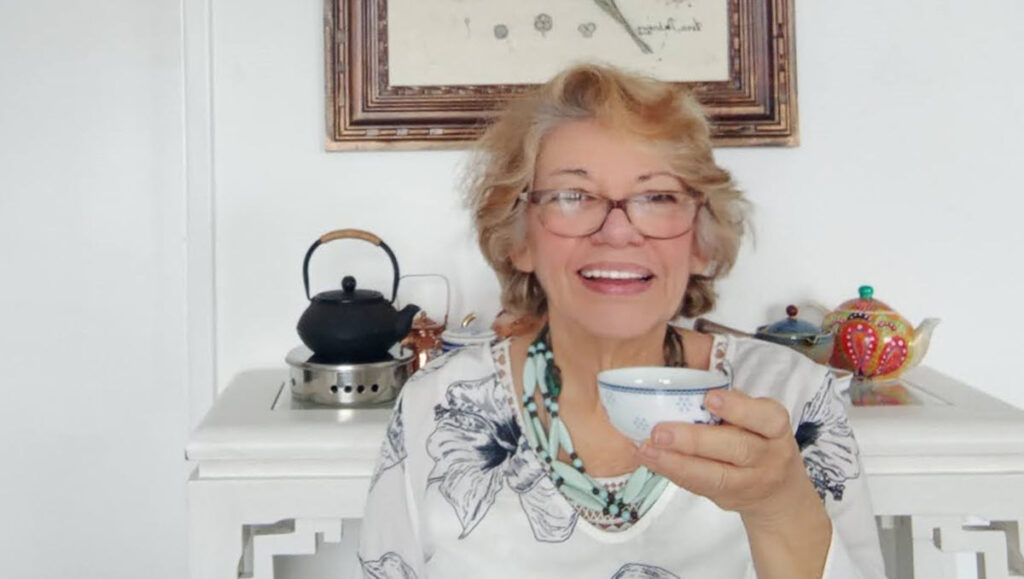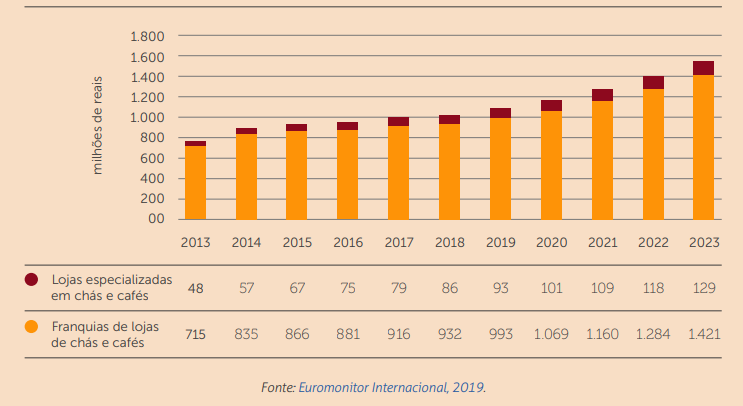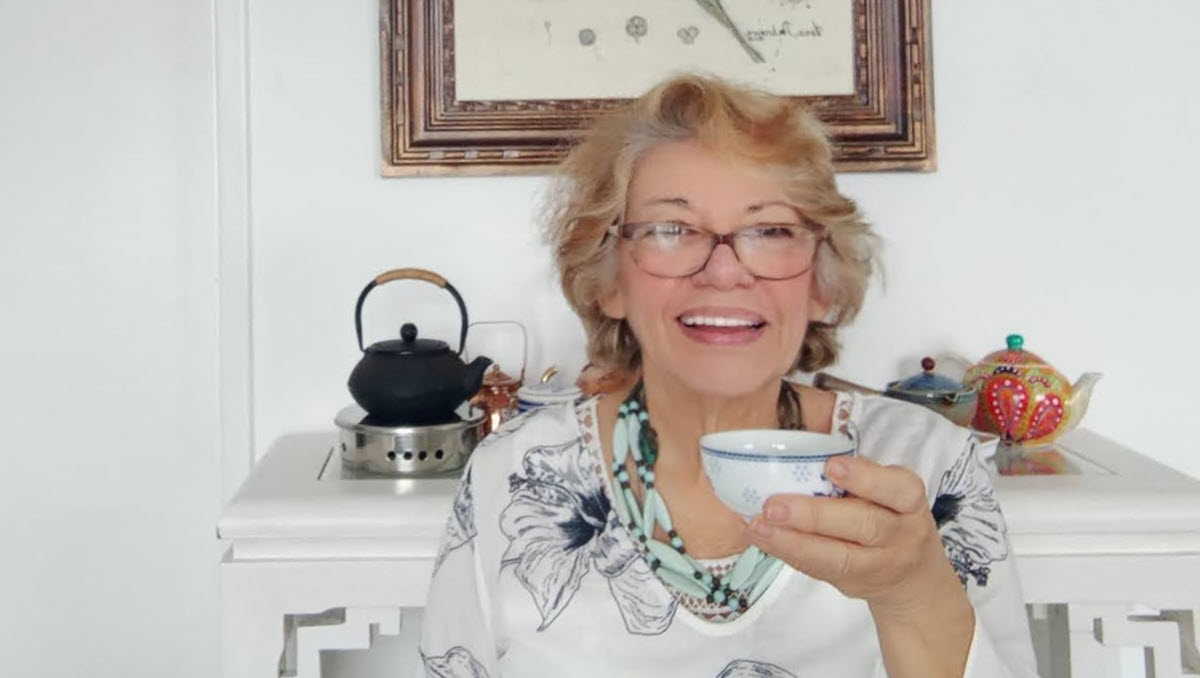Tea Culture Week, scheduled for August 1-7, 2022, will feature online and in-person activities across Brazil. Retailers, marketers, tea educators, and volunteer enthusiasts have been planning the event for months, according to Elizeth R.S. van der Vorst, founder of Amigos do Chá. Events include special tastings, formal afternoon teas, gift offers, and discounts to encourage sampling as well as public presentations, workshops, and gatherings in parks and tea houses.
Organizers include Yuri Hayashi, founder of Escola de Chá Embahu in Sao Paulo, Claudia Sant’Anna, Daniela Folquitto, Daniela Pirozzi, Ligia Gabbi, Luciana Maira, and Eli Vorst,
- Caption: Elizeth R.S. van der Vorst, Consultora de Negócios do Chá, Certified TAC Tea Sommelier
Hear the interview

1a Semana da Cultura do Chá no Brazil
1st Tea Culture Week in Brazil
By Dan Bolton
Brazil will for the first time this year celebrate one of South America’s less well-known tea cultures which dates to the early 1800s.
The more than 212 million people living in Brazil, a country hard-hit during the pandemic, are traversing a familiar path as health-conscious consumers seek plant-based foods and beverages. Brazilians traditionally consume great quantities of coffee and herbal infusions. Yerba mate remains popular in the south of Brazil.
Brazilians drink an average of 10 cups of Camellia sinensis annually – a quantity that has increased from a meager 18 grams per person consumed in 2016 – but remains well below Chile’s 730 grams per head – and much less than Ireland’s 2.2 kilo-per-person average.
In the past five years specialty tea cafes and franchised tea emporiums have flourished, says Eli Vorst. During the period 2013 to 2020 tea consumption increased 25%, “almost double the world average of 13%” according to market research firm Euromonitor.
The popularity of iced and ready-to-drink tea average less than one liter per person is also growing as Brazil develops a thirst for loose leaf Camellia sinensis.


Dan Bolton: Eli, Will you describe for listeners the tea market in Brazil?
Eli Vorst: When we started our activities in Brazil in the 1980s, importing teas from the Netherlands and later from Germany, the tea market did not exist yet. We did not have the marketing tools to spread the tea culture.
We had to work in this way: direct sales business-to-business and face-to-face convincing consumers. It was slow going, but we knew that one day this could change.
We can say that the tea market in Brazil started five years ago when there was a “boom” of new tea shops, specialized stores, new tea specialists, sommeliers, enthusiasts, and tea courses. In addition to tea courses, in 2013, we had the first official institution of tea teaching called “Escola de Chá Embahu,” founded by Yuri Hayashi and her husband, Claudio Brisighello.
In parallel with this leap in the market, we saw the growth of a tea community on social networks, which motivated a more significant number of consumers and tea lovers.
In 2020, with the pandemic, we felt a greater demand for a healthy lifestyle, generating a significant increase in the healthy food and beverage sector, including, of course, teas/blends and tisanes.
We feel that the market is growing. Due to our versatility with the Camellia Sinensis and new tendencies within mixology and culinary, we are gaining strength to dispel the myths that tea is just a hot drink to have in the winter season.
Today, our market has a growing number of tea importers, and it is worth mentioning that Brazil also has a small tea producer’s community aiming for quality specialty tea.
See: Obaatian The Brazilian Mestizo Tea
By the way, do you know that Brazil was the first country to produce tea in the Occident? The introduction of tea cultivation in 1812, with seeding, seeds, and the first Chinese tea workers to arrive in Brazil.

Dan: Will you describe the goal you have in mind?
Eli: Our focus is to expand the market and bring in a minimal of knowledge to Brazilian on the stop key. We want also to keep tea culture alive. We will be a little contribution for our tea market.
“The Tea movement is just beginning, a tip of the great iceberg. Tea culture in Brazil is still in its infancy, it may take some time, but we have to start.”
– Eli Vorst
Dan: How do you see the future of tea in Brazil?
Eli: Well, this is the question that I am excited to answer because I am very positive in the tea market, always I have been positive. I have worked 27 years in the tea market here in Brazil and I am still here. I can say that with the help of such engaged and serious people who have knowledge and such a clear vision of our tea market, all this energy can only give us a lot of hopefulness for our future. I believe that in order to obtain a well structured market, it’s necessary to create awareness and consistency with our Brazilian consumer. The consumer is the key. Teaching them is necessary in order to spread this ancient culture.
Education needs to be assertive to obtain concrete results in the future. In time the Brazilian tea market can be visible to the rest of the world. Of course, there is a need for help from various government agencies, with benefits and assistance to tea producers, farmers, and greater openness to importers, who suffer from various impediments.
The Tea movement is just beginning, a tip of the great iceberg, which is to spread the tea culture Brazil. I can categorically say that it has not been easy. We could do it all over again, if necessary, because it is worth fighting for something you believe in: Camellia sinensis is worth it. Tea is worth having as a business and as a lifestyle. But the most touching and important thing is that the tea brings us together in a passionate way, stirring our senses. This is what we like to show and teach, for those who have not yet experienced this delightful beverage, and to those who already know, we asked them to help us to spread this culture around our country.
About Amigos do Chá
Tea is a delight for the senses and has always been celebrated as a cultural treasure and an art, so our goal and contribution is to bring this comfort, relaxation, pleasure and contemplation to our customers.
About Escola de Chá Embahu
Since 2013, Yuri Hayashi has dedicated her life to teaching others about specialty tea. This pioneering work constitutes the pillars of the Embahú tea school, which has the support of her husband, Cláudio Brisighello and other tea professionals in Sao Paulo.
Link to share this post with your colleagues
Signup and receive Tea Biz weekly in your inbox.


